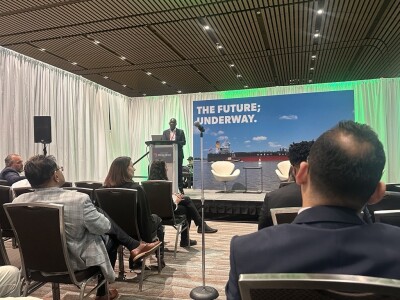Last week, several bills that would permanently ban offshore drilling along the New England and Florida coasts were introduced.
U.S. Sen. Bill Nelson, D-Fla., filed legislation that would permanently ban offshore drilling near Florida's coast. His legislation, the "Florida Coastal Protection Act’’, would "prohibit oil and gas pre-leasing, leasing, and related activities in certain areas of the Outer Continental Shelf off the coast of Florida."
Nelson made remarks on the Senate floor about the legislation and the Jan. 9 meeting at Tallahassee International Airport between Interior Secretary Ryan Zinke and Florida Gov. Rick Scott.
"I have spent my entire life fighting to keep oil rigs away from our coasts. This is a political stunt orchestrated by the Trump administration to help Rick Scott who has wanted to drill off Florida's coast his entire career. We shouldn’t be playing politics with the future of Florida."
On Jan. 4, the Department of Interior announced plans to significantly expand offshore oil and natural gas drilling leases in the Atlantic and Pacific oceans. Five days later, however, Zinke announced that Florida would be exempted from offshore drilling proposals.
Also last week, Rep. Francis Rooney, R-Fla., introduced the Protecting and Securing Florida's Coastline Act of 2018 (H.R. 4770) which would make the moratorium on offshore drilling in the eastern Gulf of Mexico permanent. “Offshore drilling in the eastern Gulf of Mexico is incompatible with our environment and endangers our military readiness," Rooney said in a statement. "The moratorium on exploration and drilling was established in 2006 and will expire in 2022 unless Congress acts. It is critical for the future of Florida and our tourism-based economy that this effort to extend the moratorium succeed."
Rooney is also a co-sponsor of two additional bills related to offshore drilling:
- H.R. 2002, Florida Coastal Protection Act – Provides for permanent extension of the eastern Gulf of Mexico moratorium, straits of Florida planning region, and South Florida planning area.
- H.R. 2261, Marine Oil Spill Prevention Act – Extends existing eastern Gulf of Mexico moratorium to 2027 and codifies current drilling regulations.
Also last week, Senators Sheldon Whitehouse, D-R.I., and Edward J. Markey, D-Mass., led a bipartisan group of New England senators in introducing legislation to bar offshore drilling along the New England coast. The "New England Coastal Protection Act" responds to a move by the Trump administration to open up Atlantic waters to offshore oil and natural gas exploration and extraction, putting vital coastline at risk and threatening a central economic engine for New England, Whitehouse's office said in a press release. Senators Jack Reed, D-R.I.; Susan Collins, R-Maine; Angus King, I-Maine; Jeanne Shaheen, D-N.H.; Maggie Hassan, D-N.H.; Richard Blumenthal, D-Conn.; Christopher Murphy, D-Conn.; and Elizabeth Warren, D-Mass.; joined Whitehouse in introducing the legislation.
Congressman David Cicilline, D-R.I., introduced the legislation in the House the same day.
“The Trump administration won’t be following through on its reckless choice to allow oil and gas drilling off Rhode Island’s coast if New England’s bipartisan members of Congress have anything to say about it,” Sen. Whitehouse said in a statement. “For the potential gain of corporate fossil fuel interests, offshore drilling would threaten the Ocean State’s coastal economy and jobs in our state, including fishermen and the thousands of people employed in tourism and recreation along Narragansett Bay.”
“We cannot risk another BP oil spill that would devastate Massachusetts’ economy and our unique environment,” Sen. Markey said. “Georges Bank should not become Exxon’s bank. This reckless drilling plan would threaten Massachusetts’ fishing and tourism industry, even as we currently export U.S. oil to China. This drilling plan is all risk with no reward for some of the most beautiful coastline in the world, and I will fight it every step of the way.”
“The Trump administration’s offshore drilling expansion plan is a threat to our economy, the environment, and public health. Rhode Islanders don’t want offshore oil rigs drilling along our coastline and their voices deserve to be heard,” said Sen. Reed. “This bill would help us to prevent oil and gas drilling in New England waters.”
“The waters off Maine’s coast provide a healthy ecosystem for our state’s fisheries and support a vigorous tourism industry, both of which support thousands of jobs and generate billions of dollars in revenue for Maine each year,” Senators Collins and King said in a joint statement. “With our environment so closely tied to the vitality of Maine’s economy, we cannot risk the health of our ocean on a shortsighted proposal that could impact Maine people for generations. We are proud to join our colleagues from New England to underscore the need to protect our waters from offshore drilling.”
“Our coastal communities in New Hampshire are critical to our economy and our environment, and we must do everything that we can to protect them,” Sen. Hassan said. “Offshore drilling has caused some of the greatest man-made natural disasters of our time, and we cannot open up our New England coastline to such potential destruction. I am proud to join this bipartisan bill to prevent that from happening and to let the Trump administration know that our coast is off limits.”





